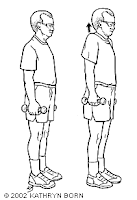I started having cervical neck pain after a patient fell while I was transferring him from a bed
to his wheelchair. It was an unexpected move and I wasn't ready so my upper Trapezius muscle ended up pulling my vertebrae out of alignment. This made my neck tighten up to the point where I could barely turn my head to shoulder check while driving.
I tried using a TENS unit at work, I went to an Acupuncturist, I had my Chiropractor friend manually adjust me at soccer and went for multiple massages. They all helped temporarily but I frequently would wind up re-injuring it at work or on the pitch. I eventually went to Physical Therapy, which helped address my wonky posture and forward head positioning, but it didn't address the neck muscle dysfunction.
I ended up complaining about the pain at work one day while I was working at another nursing facility and the other OT pulled me aside and explained he had had the same problem a few years ago. He explained to me that my neck muscles probably needed strengthening, that the reason I kept re-injuring myself was because my neck was too loose and needed more support. He encouraged me to start doing Shoulder shrugs with weights, Chest Pull exercises with a Thera-band and Chair dips. I started doing them that day and it started to help, my neck pain went away (after another adjustment from my friend, in his clinic this time) but it still felt tight and after I quit going to Massage therapy, I wanted something I could do on my own.
 |
| Resisted Shoulder Shrugs |
 |
| Chest Pull |
| Chair Dips |
I was introduced to the Cranio Cradle by a Myofascial Release therapist who recommended I get one to help release the fascia and tight muscles on my own time. I ordered it right away on Amazon and ordered a second one to gift to a friend who had always taken the time to help me with my neck! Check it out at http://www.craniocradle.com/
 |
| Cranio Cradle |
